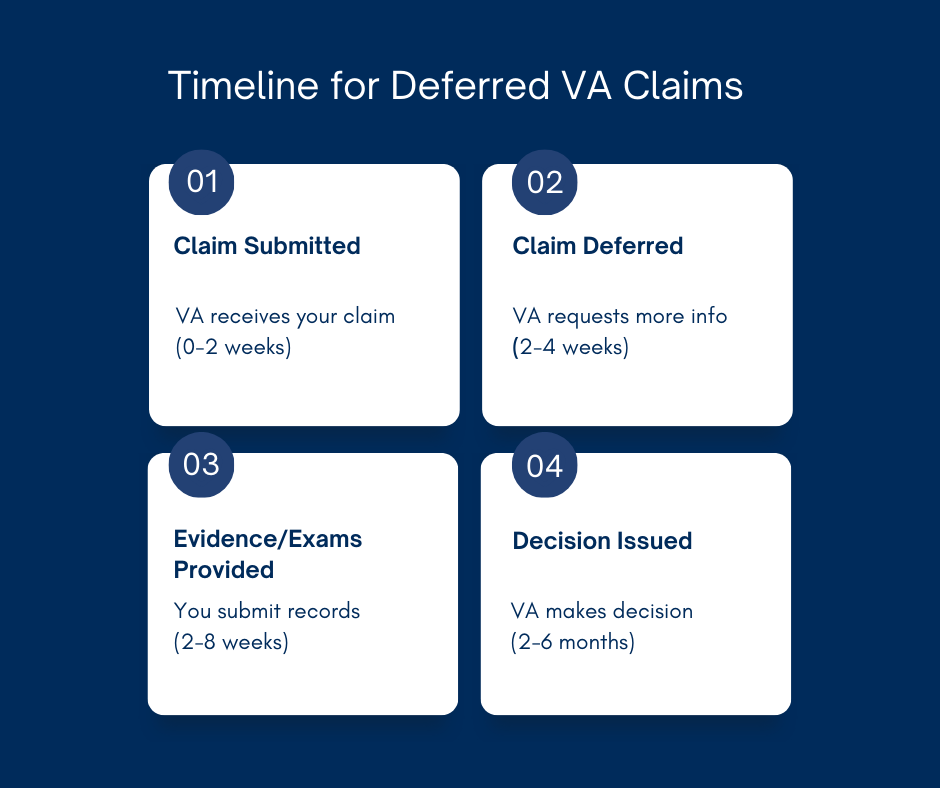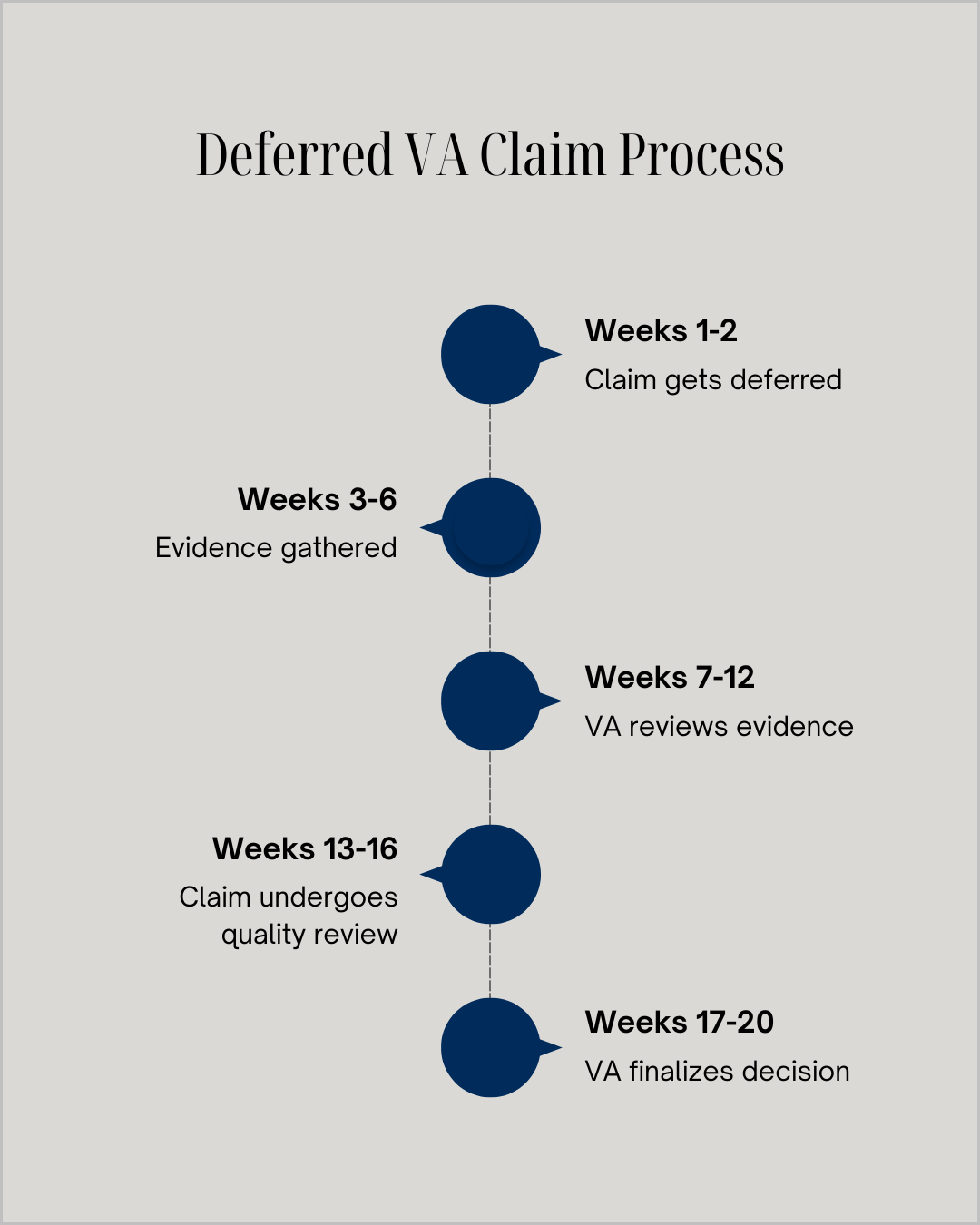How Long Does a Deferred VA Claim Take?
Deferred VA claims are one of the most stressful parts of the disability process. You can go through multiple C&P exams, submit stacks of medical records, and still find yourself waiting without a clear answer.
So how long does a deferred VA claim take? On average, it takes 3 to 6 months to be resolved, though simple cases may clear in just a few weeks while complex cases can stretch beyond a year.
My name’s Brian, and as a veteran myself, I know how discouraging it feels to see the word ‘Deferred.’ I’ve also helped countless other veterans navigate this process, and I’ve seen firsthand what can speed things up—or slow them down.
The truth is, your timeline depends on why your claim was deferred, what evidence is missing, and how quickly the VA processes your case.
In this article, I’ll break down the most common reasons for deferrals, the steps you can take to keep your claim moving forward, and what you can expect at each stage.
What Does it Mean When a VA Claim is Deferred?
Deferred VA claims are one of the most misunderstood parts of the process. In simple terms, “deferred” just means the VA couldn’t make a final decision yet.
If you check your letter, you might see wording like:
“Your claim has been deferred”
“We are still gathering information on one or more of your conditions.”
It’s not a yes or a no (I know — nothing with the VA is ever that simple). Instead, it means they need more time reviewing the specific issues with your claim.
Most of the time, it’s not your entire claim that gets deferred — just certain parts. The rest can still move forward. Sometimes, even if a condition is approved, the VA may defer the rating, meaning they haven’t decided what percent they will pay you.
Think of it like a judge holding off on a verdict because they’re waiting on more testimony. It’s not a setback or a bad sign, it’s just part of the process.
You’re still on track, and taking the right steps can help keep things moving.
Why is a VA Claim Deferred?
There isn’t just one reason a VA claim gets deferred. It can happen for a variety of reasons, and it often depends on the details of each individual case.
Some deferred issues get cleared up quickly, while others take longer. For example, missing medical info might only take a few weeks, while waiting on a new C&P exam could stretch it out for several months.
Medical Reasons:
Missing medical information - One of most common and fixable reasons for deferred claims is missing medical information. Sometimes, the rater only needs a question or two answered, but even small missing pieces can cause a delay.
C&P exam needed – Sometimes the VA wants a C&P exam to get a clearer picture of your condition and how it connects to your service. If this exam hasn’t happened yet, they can’t move forward.
Weak or missing nexus letter– This is simply a medical opinion for service connection connecting your condition to your time in service. In many cases, a strong nexus letter can be enough to move a deferred claim forward. That said, weak or incomplete nexus letters often lead to denials.
Conflicting or unclear medical evidence – If the records show different things, or if the evidence isn’t clear enough, the VA might hold off until they can sort it out.
Administrative Reasons:
Missing documents – This could be service treatment records (STRs), private medical records, or anything else needed to build a full picture of your case. If something important is missing, the VA has to wait.
Errors or incomplete forms – If a Disability Benefits Questionnaire (DBQ) or other paperwork has mistakes or isn’t filled out completely, the VA may need corrections before making a decision.
Double-check all your information before you send it. Catching small mistakes up front can save you months or years of delays.
What to Do After Your VA Claim is Deferred
The process for moving your claim forward is actually pretty straightforward as long as you stay patient and organized.
Here are a few clear steps you can take to move your claim moving forward without added stress.
Read the notification carefully – Make sure you understand why your claim was deferred and what documents or information the VA needs.
Gather requested evidence – Collect any service treatment records, private medical records, or other documents the VA asked for. The more complete your submission, the faster your claim can progress.
Schedule and attend exams – If the VA requests a follow-up Compensation & Pension (C&P) exam, make it a priority to attend. These exams are often crucial for service connection decisions.
Submit additional paperwork promptly – Don’t wait until the last minute. Sending everything in as soon as possible shows the VA you’re proactive and helps avoid further delays.
Keep detailed records – Keep copies of letters, forms, exam notices, etc. you submit. Having a clear record makes follow-ups easier if anything gets lost.
Follow up regularly – Check the VA portal or call your regional office to see if they received your documents and if anything else is needed. Staying engaged helps keep your claim from stalling.
The process is manageable if you stay patient and pay attention to detail. Staying organized and proactive is essential
And if it ever feels overwhelming, you don’t have to face it alone. Call (888) 636-3785 to connect with someone who understands the VA system and is ready to help you.
VA Deferred Claim Timeline
Here’s a typical timeline for deferred claims (though it can vary case by case):
Weeks 1–2: Your claim is flagged as deferred. The VA requests additional evidence or schedules a Compensation & Pension (C&P) exam.
Weeks 3–6: Records and medical evidence are gathered. You may attend C&P exams, and the VA adds new documentation to your file.
Weeks 7–12: The VA reviews the updated file, including medical opinions and supporting evidence, to see if your claim meets the requirements.
Weeks 13–16: Your claim enters quality review, where another team double-checks for accuracy and errors.
Weeks 17–20: The VA finalizes the decision. You’ll get a notification letter in the mail, and if approved, payments are scheduled.
Keep in mind, this is only an example timeline. It is totally normal if your claim takes more time to be completely resolved.
Factors that Affect the Deferral Timeline
Not every deferral moves at the same speed. The length of time depends on the details of your case, how complex it is, and how quickly resources are available. Here are some common examples:
Simple Deferrals
Simple deferrals are usually resolved more quickly, especially when only minor documents or routine exams are involved.
Single missing form: (such as a recent audiogram), typically resolved in 30–45 days.
Routine C&P exam rescheduled: often adds 45–60 days.
Minor records delay: (like waiting on private cardiology notes), usually about 90 days.
These cases often move faster because fewer parties and less documentation are involved.
Complex Cases
More complicated cases will naturally take longer. the VA may need multiple exams, Disability Benefits Questionnaire (DBQ), or medical opinions. Your case may take longer if it involves:
Multiple conditions: requiring different specialists may take 5–6 months.
Rare conditions: needing expert review (for example, Lyme disease) can stretch to 8–12 months.
In these cases, your VA claim may be deferred for additional development. When things get complicated, the VA often needs more evidence.
Availability of Resources
In some areas, resources are more readily available than others. Some of these resources include:
Rural backlog: delaying C&P exams often adds 3–4 months.
Military records archived off-site: can take 6–9 months.
How quickly these resources become available can significantly affect when your claim is completed.
Can You Speed Up a Deferred VA Claim?
It can feel like your claim is moving at a snail’s pace, but there are some things you can do to help it along.
What you can do:
Send everything in at once: Try to include all forms, medical records, and documents upfront. If the VA has everything from the start, it can save you months of waiting.
Keep your info current: Make sure the VA has your right address, phone, and email so they can reach you without delays.
Check online: Look at your VA.gov account to see if they’ve received your papers or if anything’s missing.
Get some help: A VSO or someone who knows the VA system can show you what to send and even talk to the VA for you.
Let them know if it’s urgent: If you have pressing health issues, tell the VA—they sometimes can move those claims faster.
While it is important to be proactive in your case, some things are just out of your hands. Here are some things that are out of your hands
Who you work with: It’s no secret that some VA staff or VSOs are easier to work with than others. Stay polite and organized, and if someone isn’t helpful, don’t hesitate to ask for a different contact or guidance.
Long waiting list: Even a perfect claim can sit for a while if the VA has a lot of cases to handle.
Exam delays: Sometimes C&P exams get pushed back because of scheduling or staffing issues. There’s not much you can do except stay ready, attend when scheduled, and keep your records organized.
Expect a delay or two along the way—this is normal and part of the process
Tips for Interacting with the VA
Many veterans don’t realize how much staying organized and keeping in touch with the VA can help speed up a deferred claim.
While you can’t control everything, being proactive makes a difference. Here are the five most important things to do:
Answer VA requests quickly: Respond as soon as the VA asks for more information. The VA likes veterans who are proactive in their case.
Use Professional Communication: Using clear, concise, and formal language with facts, dates, and references to VA regulations helps VA staff respond more effectively.
Leave Your Pride Behind: Some veterans try to appear “normal” during their exams, but downplaying what you’re going through can hurt your claim. Instead, be as honest and thorough about your symptoms as possible.
Contact Them Strategically: Reach out at the right times—if your claim is delayed, after sending new documents, before an exam, or if you haven’t heard back. Give clear details and politely ask a supervisor or your VSO for help if needed.
Get help: Hiring a VSO or accredited helper makes interacting with the VA easier because they know the system, can guide you, and speak on your behalf.
How Often Do Deferred Claims Get Approved?
The likelihood of a deferred VA claim being approved varies based on the type of deferral and the quality of the additional evidence provided.
In addition, some claims will require more work than others. For example, sleep apnea claims require extensive evidence to be approved.
While specific approval rates for deferred claims are not publicly available, here is what you can generally expect for your case.
Higher-Level Reviews (HLRs): These reviews involve re-evaluating the existing evidence without new submissions. The success rate for HLRs is estimated to be around 50%.
Supplemental Claims: These claims allow veterans to submit new and relevant evidence that was not previously considered. The success rate for Supplemental Claims is also estimated to be around 50%.
Board of Veterans' Appeals (BVA) Appeals: These appeals are reviewed by a Veterans Law Judge and offer three choices—direct review, evidence submission, or a formal hearing. The approval rates range from 34-41%.
It's important to note that these rates are general estimates and can vary based on individual circumstances.
Providing thorough and well-supported evidence can significantly improve the chances of a favorable outcome.
Deferred VA Claim and Back Pay / Benefits
A deferred VA claim isn’t as bad as it might sound. One of the big perks is back pay. This is the money you’re owed starting from your original claim date, basically the day you first filed.
Think of it as the VA “catching up” and paying you what you should have been getting all along, even if they take a while to make a decision.
Back pay exists because the VA owed you your benefits earlier than you actually received them. Because your claim was deferred, you didn’t get your benefits when you should have. How much you get and when depends on a few things:
Type of claim – Different conditions and disabilities have different rating criteria.
Full or partial rating – If part of your claim is approved first, you can start receiving partial back pay for that portion.
Processing time – How long the VA takes to review and approve the claim affects when you actually see the payments.
Sometimes the VA will grant a partial rating, which is when part of your claim is approved while the rest is still under review. In that case, you can start getting partial back pay right away for the portion that’s approved.
How to Avoid Deferred VA Claims
One of the best things you can do for deferred claims is avoid them to begin with. Here are a few things you can do to get your claim through the first time:
Submit complete documentation from the start.
Double-check DBQs and medical opinions for clarity.
Work with a VA-accredited representative or VSO.
Keep copies of everything and track your submissions.
Following these steps can save time and prevent unnecessary delays. Being careful and organized makes the whole process smoother.
Final Thoughts
Deferred VA claims can feel stressful, but most are eventually resolved within a few months, even if complex cases take longer. The key things to remember are why your claim was deferred, what evidence the VA needs, and how quickly they process your case.
The good news is your benefits are protected. Back pay starts from your original filing date, and partial ratings can get you some payments even while the rest of your claim is still under review.
This means that, while waiting can be frustrating, you won’t lose out on what you’ve earned.
To keep your claim moving, stay proactive: check your claim status regularly, submit any requested evidence promptly, and consider consulting a VA-accredited representative if you need guidance.
As someone who’s navigated this process personally and helped other veterans, I know that a deferred claim isn’t the end—it’s just a pause before your benefits catch up. Take action now, stay organized, and you’ll be closer to getting the outcome you deserve.
FAQ
-
Most deferred VA claims are eventually approved, though the timeline can vary widely depending on the complexity of the case and the evidence required.
-
When the VA defers a claim, it means they need more information before making a decision, so the claim is temporarily put on hold
-
The hardest VA claims to get are typically those involving conditions that are difficult to medically verify or link directly to service, such as certain mental health issues or rare diseases
-
Yes, a VA claim can be deferred due to the PACT Act if the claim requires additional review or evidence related to newly covered conditions under the Act. This deferral means the VA temporarily pauses processing until the necessary information or eligibility criteria are clarified.
-
A deferred VA claim isn’t necessarily good or bad. It simply means the VA needs more information before making a decision. While it can delay your benefits, it also ensures your claim is reviewed thoroughly and accurately.
-
A deferred rating means the VA has acknowledged your claim but hasn’t decided how severe your disability is yet. They may need more medical evidence, exams, or time to review your case before assigning a percentage.







